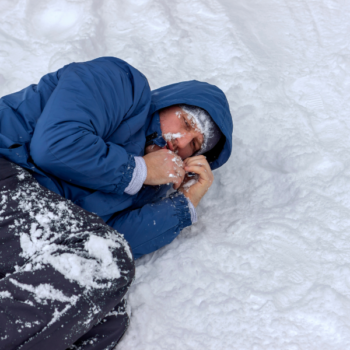 Mack brushed the frost off as he got out from under the tarp he had been sleeping under.
Mack brushed the frost off as he got out from under the tarp he had been sleeping under.
He hurriedly put his boots on and packed up his few things and started to make his way over to the Mission.
He knew he was early, but waiting at the Mission door for it to open was better than sitting on the cold ground.
He was glad for the tarp they had given him, but he was even happier that they were now opening early in the morning, instead of just at lunch. It was nice to be able to go in and get a hot cup of coffee and sit in a warm chair.
Some of the classes they were teaching were pretty weird, but he was glad they had taught him a little bit about that hypothermia thing.
Ever since he had lost his construction job in Vegas, things had gone from bad to worse. His wife had left after they had lost the house and he had been on foot ever since his truck had broken down in Phoenix.
He wasn’t used to this cold weather, but he had heard they might be hiring truck drivers at the mine and thought that it might be worth a shot.
He had gotten an introductory interview and he thought his luck just might change if he could hold on for just a bit longer . . .
Things Change For Mack
Thanks to a grant from Freeport-McMoran, the education portion of our program opens up the lunch room section of our facility to the public from 8 am-12 pm.
This 15×25 foot area includes 6 long tables and in the past was only open from 12-1pm to serve lunch in our soup kitchen. Thanks to Freeport, we have now hired additional support – training personnel so we will be able to keep this area open all morning and purchased some computers for electronic record-keeping and client resume and job search use.
This gives our homeless and at-risk populations a place to socialize, get a warm cup of coffee and donuts and participate in basic life-skills and job training classes in our self-sufficiency school.
How Does It Work?
After an initial counseling session and depending upon the level of assistance received, some of these classes are made mandatory in order to receive additional assistance (but in no case will we ever deny food to someone who is hungry or a change of clothing and jacket to someone who is cold).
The major focus of vocational training programs is to teach people the skills necessary to accomplish job tasks. However, “life skills” are just as necessary for job success.
Life skills constitute tasks that are necessary for a person to function independently and to avoid interruptions of the employment experience. When one considers all of the skills that go into maintaining a job, it becomes clear that life skills are as important as job skills.
Besides providing basic needs counseling and referral services, classes are taught in areas like time management, money management, motivation, work ethic, social etiquette and morals, health and hygiene, hypothermia prevention and prevention of carbon monoxide poisoning.
[stextbox id=”info”][Tweet “There are rules to luck, not everything is chance for the wise; luck can be helped by skill”][/stextbox]
In partnership with other local agencies, vocational training consists of GED and basic education classes, English literacy classes, resume development, career planning, computer literacy, interviewing skills and job search assistance.
On the job training consists of working in the garden, greenhouse, thrift store, kitchen and on the landscaping and maintenance crew.
Eventual sustainability of the survival packs, training supervisors salaries, class development, greenhouse expenses and administrative costs will come from the sale of fresh produce, a community day work force, similar to the CCC of depression days and catering services from our kitchen (along with our current thrift store income and increases to our donation base due to further marketing efforts).
Read more about our Self-Sufficiency School
Tell us what you think! Please click below to recommend, share and leave a comment on this page
No tags for this post.
